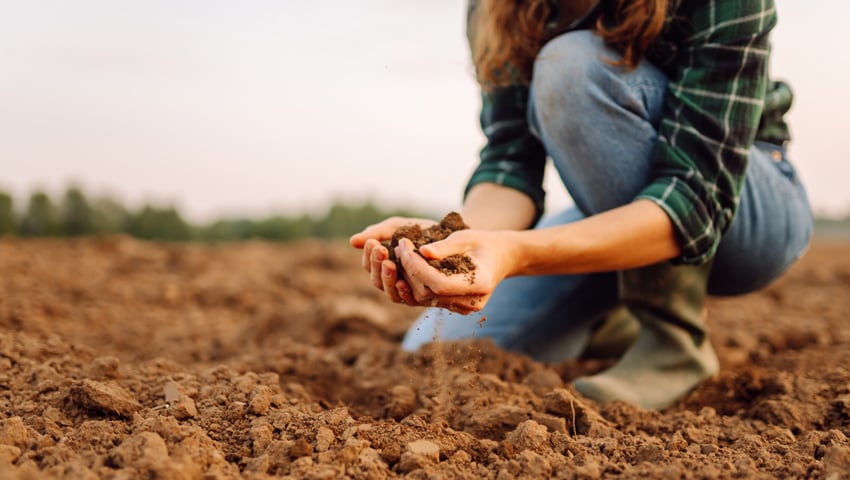The European Alliance for Regenerative Agriculture (EARA) is searching for farmers to join a fully-funded pilot study. The study will investigate whether soil health can be assessed through satellite data of photosynthesis activity and bare ground and whether this can be used as a basis for farm funding. It will be co-ordinated by EARA, a lobbying organisation of 70 European farmers promoting the redesign of agricultural policy through building resilient ecosystems across Europe.
William Houstoun, one of EARA’s founding farmers, said, “Scottish and UK agriculture needs a radical rethink, says a regenerative agriculture consultant who is appealing for volunteers to take part in a pan-European soil study that will help inform future farming policy.”
Houstoun, who farms in Angus, Scotland, believes that working with nature, rather than trying to control it, is key to the future of farming. He said, “We need to do something and we need to do it quickly,” to save the soil on which farming relies and the business environment in which it operates. However, he is optimistic that, with innovative thinking and an open, holistic mindset, agriculture can be transformed from a process of degradation to regeneration.
He said it was crucial to look at the bigger picture. “Regenerative farming practices don’t work in isolation; farm policy must be created in harmony with environmental, food, health and rural infrastructure policies. It has to be a holistic and ongoing process. In fact, it is more appropriate to say regenerating rather than regenerative, which suggests stasis.”
A principal contributor to EARA’s recently published white paper, Towards a farmer-centric CAP rooted in agroecosystem health, Houstoun said, “The formation of EARA, our white paper and connected pilot projects across European farms to find out if what we are suggesting works in practice, have all been driven by our concerns about people, nature and the competing interests of food, farming, environment and health, which should be working in harmony not opposition. We need some farmers in the UK who are regenerating their land to take part in this study so we can generate a comprehensive European picture that I genuinely think will make a difference to farming in the future.”
EARA’s white paper is a proposal for reshaping the Common Agricultural Policy (CAP) and, by extension, agricultural policies outside the EU including the UK. It argues for a switch to simple hectare-based direct payments coupled to agroecological performance, empowering farmers and fostering planning security.
Passionate about driving progressive change in agriculture and food, Houstoun said, “EARA is becoming an accepted voice in the EU where policy makers are listening to what we have to say. I believe EARA will play an important role in influencing the next round of CAP policy from 2027 and that the corresponding ripple effect will help direct future agricultural policy in Scotland and the UK.”
Houstoun, Scotland’s first Savory-accredited consultant, said that after attending both Groundswell and GO Falkland, he was encouraged by the rapidly increasing traction for regenerative agriculture but simultaneously depressed by systematic inertia and single interest lobbying. “Policy makers are beginning to talk about it but all too often it is clear they don’t really understand it. We have come a long way but still have a long way to go.”
Houstoun urged farmers to prioritise their soil health rather than using increasingly heavy machinery and chemicals with unknown long-term effects to farm damaged earth. He said, “If you’re going down a dead end road there’s not much point buying a faster car. When farmers make working with soil a priority, the difference to profits and food quality is huge. Once the soil is prioritised, everything falls into place.
“That will be particularly obvious this year after winter and spring flooding left many fields waterlogged. Looking around Angus I can see what a mess we are making of some of our farmland. We can only abuse the soil for so long.
“However, our own land and that of other regenerative farmers has been relatively unaffected by the rain. Soil degradation can be reversed if we pay attention to the soil and allow it to regenerate. It’s surprising how quickly the soil can recover and a policy that penalises soil mismanagement and correspondingly rewards best practice is crucial in moving forward.
“If we keep fighting nature, nature will win. Nature always wins in the end.”
Houstoun, who guides clients in transforming their farms, estates and rural businesses into holistically managed, regenerative and profitable organisations, added, “We used to think transition meant a financially challenging few years but now we are finding that the savings are so significant farmers can maintain their profitability throughout the regeneration of their land.
“It is not too late to change but we need a radical, holistic rethink. There is a way out of this mess and I can honestly say that the farmers who are genuinely regenerating their land are the happiest and most profitable I have met. We need to decide how we want life to be, what we want our country to be.”
For more information about the study, contact William Houstoun through his website
